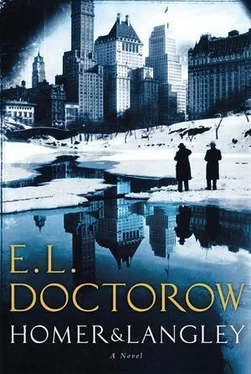OF COURSE I MISSED them, I missed their appreciation of us, if that is the word. I envied their unsafe lives. Whether their vagrancy was the heedlessness of youth or had at its basis some principled if inarticulate dissent was hard to know. It was a cultural wave that had lifted them, certainly, the war in Vietnam could not completely account for it, and any one of them might have had no more initiative than to be swept up into the wave. Still, in this house, now so terribly quiet, I felt my true age reclaiming me. Having all those people around had led me to understand that our habitual reclusion was needful. When they were gone and once again it was just my brother and me, my spirits slumped. We were our bothered selves once again with the world outside contesting with us as if it had withdrawn its ambassadors.
OUR TROUBLES BEGAN with that kerosene stove Langley had brought in. It caught fire one morning as he was cooking our omelets. I was sitting at the kitchen table and I heard this small pufflike explosion. Of course we had accumulated several fire extinguishers of different kinds and makes over the years, but whichever of them was in the kitchen was of small use — I suppose their potency evaporates over time. He gave me a running account of what was happening in a voice of controlled urgency, Langley — that the foam from the extinguisher was just enough to leave the stove temporarily fireless but smoking. I could smell it. He wrapped it in dish towels and threw the whole thing out the kitchen door into the backyard.
That seemed to have solved the problem. I knew my brother was embarrassed by the quiet way he closed the kitchen door, and I said nothing as we ate a cold breakfast.
It wasn’t more than an hour later when I heard sirens. I was at the Aeolian and thinking nothing about it — you heard fire engines and ambulances day and night in this city. I found the siren’s notes on the piano — A’s sliding into B-flats and back to A’s — but then the sound got closer and died into a low growl seemingly right in front of the house. Poundings on the door, shouts of Where is it, where is it? as this herd of firemen clambered in, pushing me aside, cursing as they tried to find their way to the kitchen, and dragging hose behind them, which I tripped over, Langley shouting What are you doing in this house, get out get out! They had been called by the people in the brownstone next door, whose garden abutted our backyard. In all these years we’d never met these neighbors or spoken to them, we didn’t know who they were except as the likely culprits who’d left an unsigned letter in our mail protesting our tea dances of so many years before. And now they had reported that our backyard was on fire, which happened to have been the case. Why can’t these people ever mind their own business, Langley muttered as the fire hose, connected now to the hydrant at the curb in front of the house, pulsed through the labyrinth of baled newspapers and slapped this way and that into folded chairs and bridge tables, knocking down standing lamps, stacks of canvases, as the firemen aimed their nozzle through the back door down to the smoking racks of lumber, the used tires, and odd pieces of furniture, a legless bureau, a bedspring, two Adirondack chairs, and other items stored there in the expectation that someday we would find use for them.
Langley would insist afterward that the firemen had overreacted, though the smell of smoke would linger for weeks. When an inspector from the Fire Department arrived he looked over the smoking rubble and said we would be issued a summons and most likely fined for illegal storing of flammable materials in a residential neighborhood. Langley said if that were the case we would sue the Fire Department for the destruction of property. Your men’s boots have left a trail of mud on our floors, he said, the back door of the kitchen is off its hinges, they have stormed through here like vandals as you can see from these broken vases, these lamps here, and look at these valuable books soggy and bloated from the damn leaks in their hose.
Well, Mr. Collyer, is it? I should think it’s a small price to pay for having still an abode to live in.
The fire inspector, whom I took for an intelligent man of some years — he had used the word abode , a word you did not often hear in ordinary conversation — surely had looked around, taking it all in, and though he didn’t say anything, he must have passed on what he had seen of our rooms for within a week or so we received a certified letter from the Health Department requesting an appointment for the purpose of assessing the interior condition of — and here they indicated our home by its address.
We of course ignored the letter but our sense of a diminished freedom was palpable. All it took was for people with official credentials to have intentions regarding us. I think it was at this time that Langley ordered a complete course of law books from some college in the Midwest that offered a law degree by mail. By the time the books arrived — in a crate — we were in the sights not only of the Health Department, but of a collection agency acting on behalf of the New York Telephone Company, of lawyers from Consolidated Edison for having damaged their property — I assume they meant the electric meter in the basement, an irritating buzzing thingamajig which we had silenced with a hammer — and of the Dime Savings Bank, which had inherited our mortgage and claimed that in failing to meet our payments we were facing foreclosure, and the Woodlawn Cemetery had drawn a bead because we had somehow forgotten to pay the bills for the care of our parents’ grave site. That wasn’t all of it — there were other letters popping through the mail slot in the front door whose contents I can’t recall just now. But for some reason it was the cemetery bill that most engaged my brother’s attention. Homer, he said, can you think of anyone as depraved as these people who live on death even to the point of charging good money for snipping some leaves of grass around a headstone? After all who cares what graves look like? Certainly not their occupants. What a fraud, this is sheer irreverence, the professional care of the dead. Let the whole cemetery go back to its wild state I say. Just as it was in the days of the Manhattan Indians — let there be a necropolis of tilted stones and fallen angels lying half hidden in the North American forest. And that to me would show true respect for the dead, that would be a sacred acknowledgment, in beauty, of the awful system of life and death.
—
I HAD THE IDEA of ranking our problems as a means of solving them and the mortgage seemed to me the first order of business. It was a struggle to get Langley to sit down and go over our finances. He felt attention to these matters rendered one subservient. But I realized from his reading of the account books that we had sufficient funds to pay off the mortgage altogether. Let’s do that and get these people off our backs, I said, and never again will we have to worry about it.
We lose the deduction on our federal taxes if we pay off the damn thing, Langley said.
But we’re not getting the deduction if we’re not meeting the payments, I told him. All we’re getting is penalties that offset the deduction. And why are we talking about taxes since we don’t pay them.
He had an answer for that having to do with the war, though it went on from there and I’m not sure I can render it accurately. Something about primitive societies that function brilliantly without money, and then a discourse on corporate usury, and then he burst into song: “Oh the banks are made of marble / With a guard at every door / And the vaults are stuffed with silver / That the miner sweated for.” Langley’s tone-deaf, hoarse baritone was an instrument of undeniable power. I did not laugh or speak of the genetic caprices in life whereby a musical gift could be designated in its entirety to one brother, namely me. I did wonder what miners had to do with anything. Homer, he said, I remind you of the derivation of our name. Were not our paternal ancestors diggers in the bowels of the earth? Were they not coal miners? Is a collier not a coal miner?
Читать дальше












